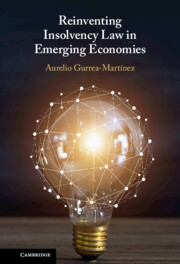‘Professor Gurrea-Martinez’s book is a must read for anyone interested in international insolvency and especially anyone involved in designing law in emerging markets. Gurrea-Martinez provides the most comprehensive analysis to date of insolvency law around the world. He adeptly introduces the reader to the purposes of insolvency law as well the limits of what it can accomplish. He then introduces the reader to his two main themes: 1) the design of insolvency law must be designed with due attention to local institutions and financial markets; and 2) insolvency law properly designed can be a catalyst for economic growth. Professor Gurrea-Martinez compelling argues that with appropriate attention to these themes, insolvency law can be a transformative force.’
Anthony J. Casey - Donald M. Ephraim Professor of Law and Economics; Faculty Director of The Center on Law and Finance, The University of Chicago Law School
‘Aurelio Gurrea-Martínez has written a tremendously well researched and thoughtful book on the role of insolvency law in emerging economies. It is a must-read for anyone involved in the insolvency business. Professor Gurrea-Martínez weaves together very adroitly the role insolvency law plays in driving business behavior in the economic system. In addition, any executive or director of a company in emerging jurisdictions would be well-placed to read this book. A true tour de force!’
James Sprayregen - P.C., Partner (Restructuring Group), Kirkland & Ellis, Chicago and New York; Adjunct Professor of Finance, The Wharton School, The University of Pennsylvania
‘In Reinventing Insolvency Law in Emerging Economies, Gurrea-Martínez contends for a pressing need to rethink insolvency systems ‘around the world’. He cushions his blows by politely designating insolvency laws in various countries as ‘unattractive’, exacerbated by equally ‘unattractive market and institutional environments’. The power of Gurrea-Martínez’s analysis emerges from his logical unpacking of exactly how this counter-intuitive notion is grounded in practical reality. At the heart of this book is a prescription for how to approach insolvency law reform in emerging economies, accompanied by a nudge against complacency by those more prosperous countries. It is refreshing - and a relief - to read Gurrea-Martínez’s roadmap for insolvency system success: it is grounded in the reality of social, political, economic, judicial and capability challenges, rather than impractical, lofty and esoteric ivory-towerisms.’
Scott Atkins - President & Fellow, INSOL International; Global Head of Restructuring, Norton Rose Fulbright
‘Reinventing Insolvency Law in Emerging Economies insightfully explains why most insolvency-law regimes in poorer countries fail to foster economic growth. Aurelio Gurrea-Martinez draws upon his extensive knowledge of insolvency regimes globally to show that developing nations have erred by importing regimes from advanced economies without tailoring them to local financial and institutional conditions. He shows the importance of country-specific factors such as the depth of capital markets, the rule of law, and the sophistication of courts. He then creatively identifies ways that insolvency law can be adjusted for emerging economies, such as by giving creditors more power and relaxing rules that stigmatize insolvency. This comprehensive book will surely inspire discussion and reform proposals in jurisdictions around the world.’
Richard Squire - Professor of Law and Alpin J. Cameron Chair in Law; Director of Fordham Corporate Law Center, Fordham Law School
‘Aurelio Gurrea-Martínez rethinks insolvency law in emerging economies. He breaks new ground by systematically linking legal strategies to the specific characteristics of local markets and institutions. In particular, the book discovers patterns that match regulatory options with the particularities of local actors and frameworks. A great joy and must read for everyone interested in making, understanding and practicing insolvency law.’
Felix Steffek - Professor of Law; Director of the Centre for Corporate and Commercial Law, University of Cambridge
‘As economies emerge out of the Covid-19 pandemic and simultaneously deal with the post-pandemic economic uncertainties, the need for efficient mechanisms for resolving financial distress is a policy priority. Although the book focuses on emerging economies, it clearly articulates key aspects of insolvency law that cut across all jurisdictions including the objectives, frameworks and institutions for resolving financial distress, as well as common challenges, such as stigma, costly and inefficient resolution processes. A key message of the book is that the common elements do not justify a ‘one size fits all’ approach as evidenced by the simplistic transplantation of insolvency and restructuring procedures. The book presents key policy considerations for redesigning insolvency systems including considering alternatives to formal resolution processes.’
Winifred Tarinyeba Kiryabwire - Associate Professor, School of Law, Makerere University, Uganda



